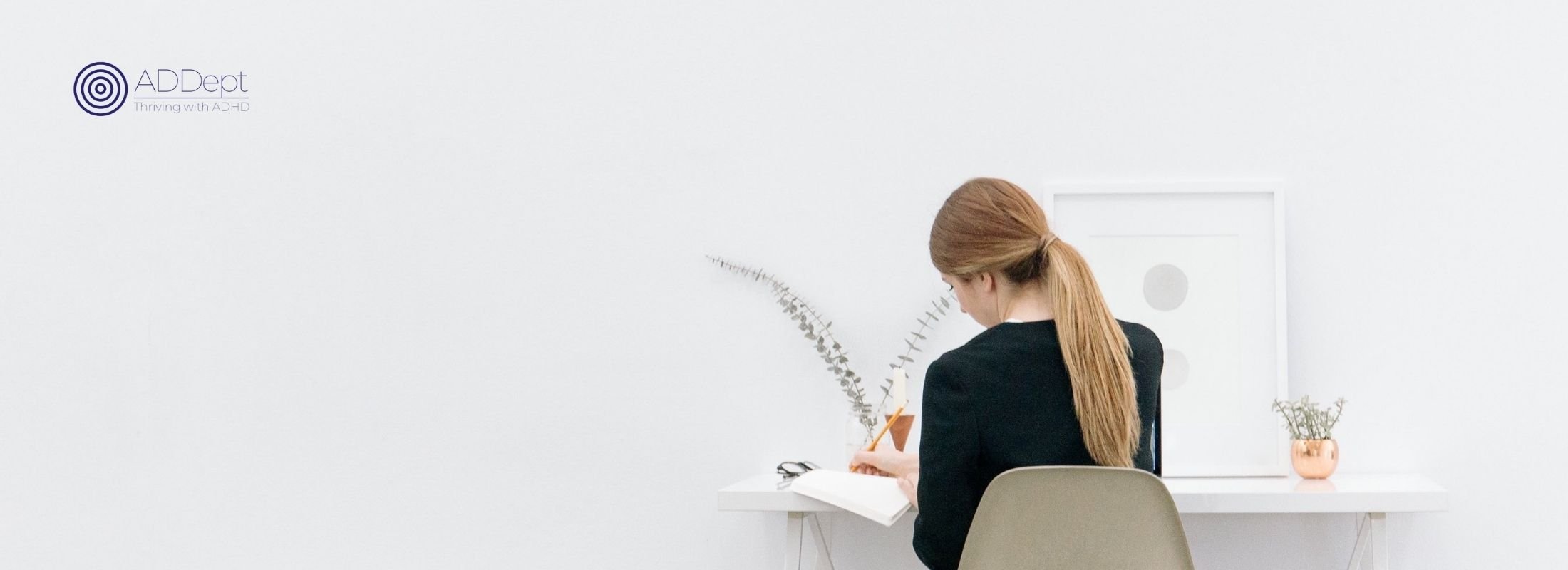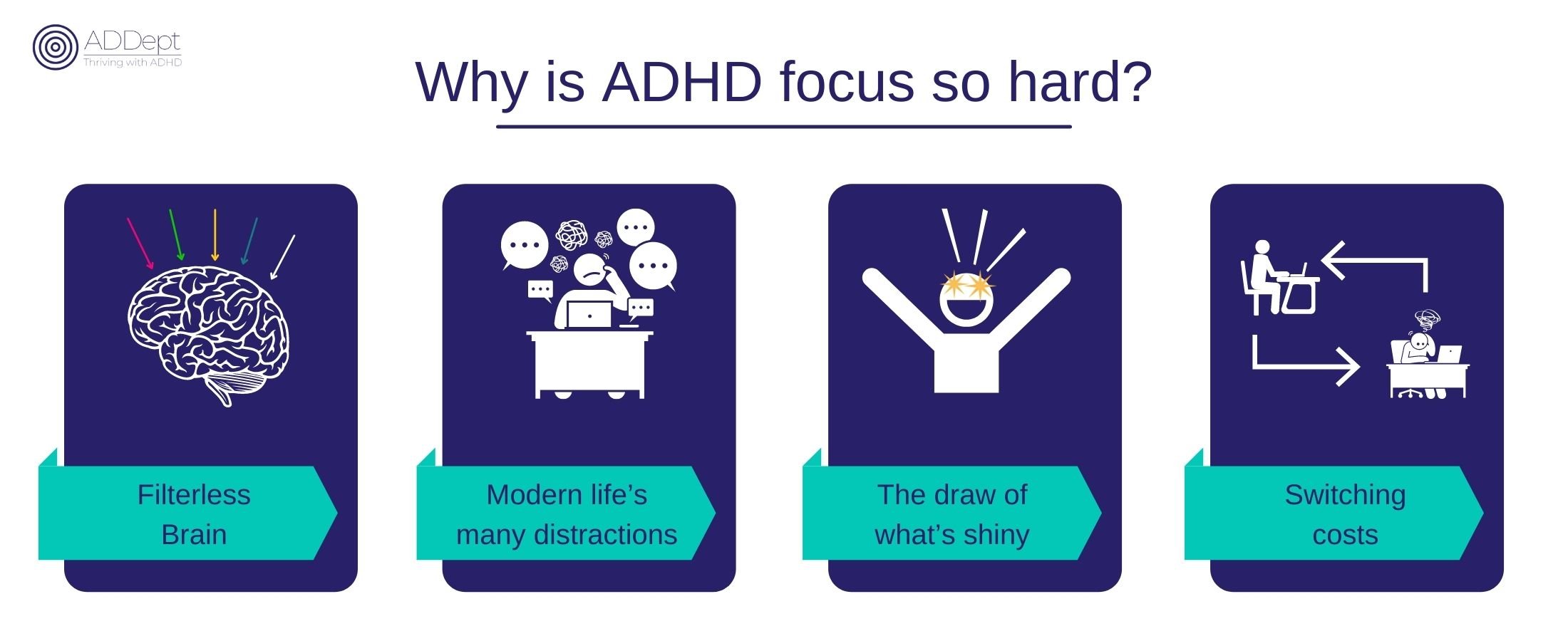How to stay focused at work with ADHD
You’ve got 78 tabs open, there are 8 to-dos circling your brain, and your boss is expecting that report in an hour… but you’re researching the best type of basketball hoop to get your newly-basketball-obsessed 7-year-old.
So you know– basically, it’s a regular Tuesday afternoon.
When you have an ADHD brain, staying focused at work can be a real challenge. There are so many things vying for your attention, and your brain’s depleted executive functioning system makes it tough to keep your mind on the task at hand.
Why is ADHD focus so hard?
4 main factors make focus so hard for the ADHD brain: its lack of filter, the many distractions of modern life, the draw of what’s shiny, and the cost of switching from task to task. What’s all that mean for you and your life? Well, let’s dive in and find out more.
The Filterless Brain
ADHD brains lack a filter for all the information that comes into them. This means it’s being constantly bombarded with stimulation from both outside (the environment) and inside (thoughts, feelings, impulses, etc.). And unlike a neurotypical brain that has a mechanism to hone in on one thing and tune the rest out, the ADHD brain doesn’t have a way of filtering out all the information that’s not relevant to the task.
It's like a TV playing 20 channels at once, at various volumes and intensities. It’s a lot going on and it makes it really hard to absorb any information on one particular channel.
Modern life’s many distractions
Now, that 20 channel TV would be hard enough just with all the thoughts and feelings and impulses that pop up. But today’s world includes so many external distractions it’s enough to make me dizzy just thinking about: email notifications, phone calls, text messages, push notifications (and that’s just from your phone!). Each and everything clamoring for your attention is like an additional channel being added to the mix.
The draw of what’s shiny
When each internal and external distraction is another channel on your TV’s lineup, trying to focus on the important channel is hard enough. But, what makes it extra challenging for ADHD brains is that an ADHD brain is motivated by novelty. This means that anything new, anything that’s shiny and exciting, will naturally draw attention. So when a new channel on your brain’s TV turns on- it’s new and therefore instantly shiny and your brain is naturally drawing to it. So you may be plugging away on that report, but an idea to look into that new speaker you wanted to buy for your sound system pops into your head, and poof- all focus is lost.
Switching costs
But if the struggle were just about having too many channels going or getting sidetracked, even that wouldn’t be so bad. If you had an unlimited supply of executive functioning energy to manage bouncing from channel to channel, you could probably push through. But every time your brain gets distracted, it has to:
stop the task at hand
switch to the distraction
get going on the distraction
monitor that it’s not where it should be
stop the distraction
switch back to the task at hand
get going on that task
Each one of those steps is an executive function. That’s 7 charges to the executive functioning account for just one distraction. When you think about all the distractions in your life- those charges are going to add up quickly and your limited supply of executive functioning energy is going to be maxed out long before everything that needs to be done is finished.
This is why it’s extra essential for an ADHD brain to give itself every opportunity to stay on track.
7 Tips for Staying Focused at Work
1. Complete a distraction inventory
Everyone’s work distractions are different- if you’re working at home- maybe it’s the dishes in the sink or the overflowing laundry basket that call your attention. If you’re in an office- maybe it’s the chatting that’s happening in the cubicle next to you or every person that walks by on their way to the bathroom. And no matter where you work, I’m willing to bet your phone or the internet at large calls your attention away pretty regularly.
In order to know how to best eliminate distractions, you need to first know what they are. Spend a day noticing the things that draw you off course, and then create an inventory of all of your distractions. This inventory is the TV guide for your 20 channel brain. Once you know what the channels are, you can start turning them off.
2. Eliminate all possible external distractions
How many things on your inventory are external? These are the first things to eliminate.
Does the pile of clutter on your desk make you want to organize? Can you put the pile of papers from your desk on the floor out of sight?
Are the new message notifications on your phone taking your attention away? Can you put it on Do Not Disturb for an hour or plug it in in another room?
Are you constantly avoiding work by attending to all the little household tasks that you see? Can you use a different bathroom so you don’t walk y the dirty dishes in the sink? Can you put the dirty laundry basket in your bedroom with the door closed?
How can you eliminate all of these shiny, novel things from your awareness? Notice, I didn’t say- create a habit of doing the dishes after every meal or file all your papers. No. If you wait to have the decks cleared and every system in place to keep it that way before you can focus, you’ll never get to work. The goal here is to eliminate the distractions from awareness- not from life. Because it’s their presence in your awareness that draws your attention away. So turning off their channel in your brain means you have one less thing drawing your focus away.
3. Create set email/ call times in your day
Email/ texts/ calls are all one of the biggest distractions and time-takers of our lives, yet they are also essential comments of our work. But if you’re constantly being barraged by notifications or even if just having the email tab open constantly takes you off track, try setting up 2-3 times in your day when you address emails/messages. This assures important messages are addressed but keeps them contained and keeps your focus free during the rest of the day.
4. Put yourself on Do Not Disturb (notify others)
Nothing’s worse than getting into a flow with your work and having someone interrupt you. So, try creating a system with people around you, so they know when you are open for interruptions and when you’re not. It could be a sign on your door, over-the-ear headphones, even a funny hat. But whatever it is, make it clear what it is and what it means.
5. Keep a running list of tangential thoughts/ ideas/ tasks.
One of the biggest distractions can be all the thoughts, brilliant ideas, and endless rabbit holes our brains can take us on. Try keeping a notepad beside your computer that you jot those ideas down onto. Then, when you have finished the task at hand, you can look at your list and see what still feels essential. It could be something to research, someone you want to check in with, or something completely random- but if it’s not the straightforward task at hand, it goes on the list.
6. Plan your day and tasks ahead of time
Planning out your day and your tasks when your executive functioning battery is fully charged gives you the chance to decide what your priorities are before new shiny things enter the picture. This not only keeps you from having to weigh the importance of your tasks all along the way. But it also allows you to stay in action mode rather than switching from action to plan and back to action again, over and over.
7. Take (real) breaks
You can’t focus for 8 hours straight. That’s not your ADHD; that’s just being human. You need a break- you need lots of breaks, actually. So after you finish a task, or every 40 minutes, or whatever system works best for you, force yourself to stand up and take a break.
But be careful- just switching tabs over to YouTube- that’s not a break. That’s a distraction. Breaks should be (at least a little) rejuvenating, not just a rest. So get up, move around, do something different for a short time and give your brain the rest it needs.
There are so many things about our lives and brains that make focus tough. But that brain of yours? It’s got some incredible brilliance to share. So eliminating as many distractions as possible is critical to getting all that great stuff out and into the world. And while you may never eliminate all the distractions, you can make it easier to get and stay focused when you need it most with some conscious effort and strategies. What are your favorite work focus strategies? Tell me in the comments below!
Ready to shift from
meltdown to mastery?
This online course has been designed specifically to help teach the strategies ADHD brains need to help them move from overwhelm and meltdowns to confident emotional mastery.
Want to know more about
thriving with ADHD?
Check out these other articles:














My 10 Favorite Things About Using a Planner